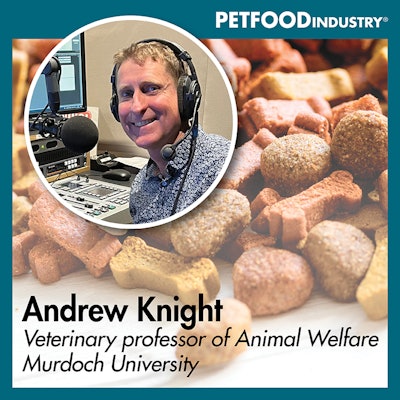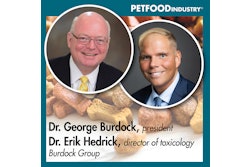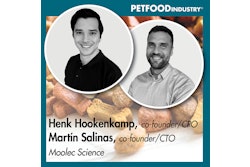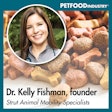
The British Veterinary Association (BVA) recently updated its stance on vegan diets for dogs, now supporting them as long as they are nutritionally complete, marking a significant shift from its previous opposition. This change follows increasing scientific evidence demonstrating that well-formulated vegan diets can sustain animal health. Host Lindsay Beaton and Dr. Andrew Knight, veterinary professor of Animal Welfare at Murdoch University, break down what all this means for the pet food industry in the coming years.
The below transcript is from Episode 74 of the Trending: Pet Food podcast. Host Lindsay Beaton discusses vegan diets for dogs and cats as well as what the end of the British Veterinary Association’s opposition to vegan diets for dogs means to the pet food industry with Dr. Andrew Knight, veterinary professor of Animal Welfare at Murdoch University. You can find the episode at Trending: Pet Food, on SoundCloud or on your favorite podcast platform. This episode originally aired on November 12, 2024.
We want to thank Coperion for sponsoring this podcast. For over 50 years, Coperion has supplied the most recognized pet food brands throughout the world with state-of-the-art dry bulk material handling systems.
Lindsay Beaton – editor, Petfood Industry magazine, and host, Trending: Pet Food podcast: Hello, and welcome to Trending: Pet Food, the industry podcast where we cover all the latest hot topics and trends in pet food. I’m your host and editor of Petfood Industry magazine Lindsay Beaton, and I’m here today with Professor Andrew Knight, a veterinary professor of Animal Welfare affiliated with Murdoch University veterinary school in Western Australia and two other universities. Hi Professor Knight, and welcome!
Dr. Andrew Knight, veterinary professor of Animal Welfare at Murdoch University: Hi there. Thanks for having me on the show.
Beaton: In case you’re unfamiliar with Professor Knight or his affiliations, here’s what you need to know.
Andrew Knight is an experienced dog and cat veterinarian affiliated with three universities and is a veterinary specialist in animal welfare accredited in all world regions where that’s possible – in the UK/Europe, U.S., and New Zealand. He’s published 12 scientific studies, book chapters, etc., on vegan pet food which are regularly reported in news outlets globally. He received a Ph.D. in this area earlier in 2024. He often works with animal charities and is frequently interviewed by the media. He has received over 20 awards and research grants for this work. He’s currently based in the UK.
Professor Knight’s longtime studies of and experience in animal welfare and nutrition, as well as his specialty focus in vegan pet food, are why I’ve brought him on today to answer this question: What are the ramifications of the British Veterinary Association’s shift in stance on vegan pet diets?
Vegan pet food diets are a hot topic right now in the pet food arena, so I want to talk a little bit about the history of vegan diets in the pet space. When did they start getting seriously considered for dogs, and overall, how did they come to be to begin?
Dr. Knight: Almost all the scientific research in this field has occurred since 2020; there's been very few studies. Prior to that time, there were two main research groups in the world doing this work: Dr. Sarah Dodd at the University of Guelph veterinary school in Canada and her collaborators. She's a veterinary nutritional specialist who's also done a PhD on vegan pet food. And myself and my collaborators at the University of Winchester in the United Kingdom, and now Murdoch University veterinary school in Australia and Griffith University.
We've collectively been publishing a sizable body of evidence, particularly looking at health outcomes for dogs and cats maintained on vegan diets. We want to focus on nutritionally sound vegan diets -- that's always such an important point to make -- and other key aspects, such as the environmental sustainability implications of these diets, the palatability, and manufacturing processes with the aim of ensuring nutritional soundness of these diets.
We've studied all these sorts of things, and there's now a big body of evidence that's just appeared, most of it since 2020. New studies come out all the time, as you would be aware. I've just published with my collaborators another big study on health outcomes in dogs maintained on vegan diets. It's a super exciting area. It's sort of upended previous understanding of this issue. It's really turned the tables.
We've always assumed that dogs and cats are carnivores, or at least omnivores in the case of dogs, and been very skeptical about whether they can be healthily maintained on vegan diets. The research has shown -- providing the diets are formulated to be nutritionally sound by good companies taking good steps to do that -- the outcomes are really good. The environmental sustainability implications are enormous and game changing for this area. It's a very exciting space.
Beaton: What was the catalyst for this starting to be a conversation to begin with? You've mentioned sustainability, and I'm assuming that that has something to do with it. Protein availability as well as companies and consumers looking for alternate proteins for their pets. Why is this turning into such a big thing now?
Dr. Knight: I think there's been a trend over time for people to be increasingly concerned about several things. One is the health and wellbeing of their cats and dogs who are living longer. People want better standards of care, including better veterinary care and also better diets. For them, they're increasingly being seen as family members and people are looking for good quality diets to maintain their health long term.
Another issue is we're increasingly aware of the impacts of the livestock sector on things like greenhouse gas emissions, deforestation, freshwater use and so on. The livestock sector is just about the biggest cause of deforestation globally, and it's certainly one of the top causes of greenhouse gas emissions, being responsible for probably about 25% to 28% of all human-generated greenhouse gasses, which is far more than the entire transportation sector, for example, which is more like 13%. People are increasingly concerned about that, and the animal welfare issues associated with intensive farming of food animals that are used in the food system.
We now farm about 80 billion land animals each year. That's 10 times the human population of the Earth. We also kill about one to 3 trillion fish and marine animals in the food system each year. Of the farmed animals globally, some 90% are intensively farmed in very high stocking densities in very small and relatively barren environments with minimal opportunities to exercise highly motivated natural behaviors, and this is chronically stressful for them.
I think people are increasingly aware of these issues and interested in considering alternatives to meat-based diets. Indeed, there have been two large scale surveys done now looking at what proportion of pet guardians would be interested in alternatives to either conventional or raw meat-based diets. They found that 35% to 46% of consumers say that they would realistically be willing to consider alternatives, not just vegan ones, but also cell-based meat diets, which are also starting to come on-stream and will grow in the future years.
People are concerned about these sort of mega-drivers -- concerns about environmental sustainability, for example, and greenhouse gas emissions are not going to be a passing fad. They're not going to decrease over time. They're only going to increase further as the impacts of climate change become ever more obvious as time passes.
I think these trends are going to increase over time and that any diets that are developed for pets that can fulfill these top concerns of consumers about things like good health outcomes, environmental sustainability and good animal welfare for food animals are likely to do well in the future.
Beaton: Let's talk more about good health outcomes, because there are currently quite a few arguments on both sides about the safety of vegan protein and animals that have traditionally eaten meat and the nutritional compatibility and the nutritional completeness of such diets.
What have been some of the arguments for and against vegan diets for pets? How has that all played out on the stage? Because there are vegan diets out there now, so clearly, education is happening. What are some of the top things that consumers are concerned about when it comes to this type of stuff? Where's the education focusing?
Dr. Knight: You're right. There's been an explosion of development of these new diets. About three years ago, I had companies coming to me saying, we're a Star Club company wanting to develop a vegan pet diet. Can we have a review of the research in Syria? That would happen about every two or three months, and now it's every two or three weeks.
There’s been this explosion of interest in developing these diets. In the UK, we've just seen the first case of a major company buying out one of the smaller companies, which is exciting because they have much bigger distribution of marketing networks and can scale these diets up.
As you mentioned, there are arguments against the use of vegan diets. People tend to cite concerns about whether the nutrients will be sufficiently digestible, for example, or adequately palatable. We've studied the palatability, and so have many other studies before us. We did a study looking at behavior when these types have been consumed by dogs and cats and looking to see whether there were any signs of any differences in how much they're enjoying the food.
Of course, individual animals will have preferences and personalities, but we looked at large numbers. We looked at over 2,300 dogs and 1,100 cats, and analyzed every descriptive palatability that's ever been described in the science and analyzed all the differences statistically. We found that, on average, there was no significant difference between how much animals seem to be enjoying vegan diets and meat-based diets. Individual animals may have preferences, but on average, there are no differences.
The health outcomes are even more interesting. Even more important for many pet owners, people worry about things like the digestibility and the interaction of nutrients in vegan diets. At the end of the day, the gold standard test is, what are the impacts on the animals itself? If the animal seems to be doing well, then presumably we don't need to worry about those potential concerns.
I have looked for evidence about things like digestibility. The data doesn't seem to exist on many of the ingredients that are used. The data that I have found indicates comparable digestibilities between plant- and meat-based ingredients.
One of most recent studies surprisingly shows the digestibility of plant-based ingredients are better than those on meat-based ingredients, but I think others probably show it's less. The difference seems small. Overall, nothing's 100% all of them seem reasonably good.
But as I say, the gold standard test is really what is the effect on the animal. There have now been 12 studies, including the one that's just been published, looking at health outcomes in dogs maintained on vegan or vegetarian diets. Eleven of those 12 have shown equivalent or superior outcomes when vegan or vegetarian diets are used, and one showed an inferior outcome. For cats, there have been three studies, so a smaller number, but some of these are very large-scale studies. Nevertheless, all three of those showed equivalent or superior outcomes when cats are maintained on vegan diets. That’s the evidence so far.
People may have personal opinions and concerns about experiences from individual animals, but when you look at large scale studies of large numbers of animals, science so far has indicated very, very consistently, actually and clearly that -- providing the diets are formulated to be nutritionally sound -- the dogs and cats maintained on vegan diets seem to be having health outcomes as good, or in some cases better than those maintained on meat-based diets.
There seem to be a couple of reasons why there are better health outcomes consistently coming up across these studies, which is another interesting area as well.
Beaton: I feel like it's easier for people to get on board with dogs because they're omnivores, and there's been more research done. Cats are a very contentious subject in terms of vegan protein versus animal protein.
What are some of the main concerns there? How is it different from dogs? And how do you ensure that cats are getting what they need without a carnivorous diet?
Dr. Knight: Dogs have been co evolving with humans for 20,000 to 40,000 years, and over that time, have evolved from carnivorous wolves into omnivorous domesticated dogs. Cats have not undergone that same process. Their co-evolution has been more like 8,000 years, and their role has been different. They haven't been scavenging on human food scraps. They have been really guarding our food stores, our grain stores and other food stores, from rodents, and they've been welcomed to provide that role.
They've remained carnivores in their natural environments. You know, if you think about what a cat would eat in its natural environment, it would be a mixed diet of small mammals, perhaps birds, large insects at unpredictable times, followed by uncertain periods of hunger. If you compare that to the diet of a modern, domesticated house cat, which consumes a meat-based diet usually formulated with body parts from animals it would never naturally hunt unnatural additives packaged into dry kibble and other formulations and fed at predictable times daily.
It's clear the feeding regime of a domesticated house cat is very far removed from any kind of a natural feeding regime that an ancestral cat might have had. This doesn't really matter to the cat very much at all. It might matter to how people feel about it.
What cats need biologically are some very simple things. They need a diet that supplies all the nutrients that cats need, that is sufficiently palatable so that they're happy to eat it, and sufficiently digestible so that the nutrients will be absorbed into the bloodstream, circulate around the body to be bioavailable and taken up by the cells and used. If we formulate a diet that is entirely vegan, or indeed some other kind of a diet which meets all those criteria, you expect the cats to do just fine. That's what the studies have shown so far for the vegan diets.
There's no biological requirement for cats to eat meat, nor is there for any species to eat any ingredient. What the requirement is for cats to receive certain specific nutrients. The nutrients, for example, are 11 essential amino acids, a high requirement of protein for cats, particularly high compared to dogs, and various macro and micronutrients as well.
What responsible pet food companies are doing today is working with veterinary nutritionists or other nutritional experts to formulate vegan cat diets and vegan dog diets, which supply all those needed nutrients from plant sources, mineral sources and synthetic nutrients. All of which are also normally included in meat-based pet foods, just in different amounts.
There is no biological requirement for meat or any other ingredient for cats, dogs, humans or virtually any species. The requirement is for specific nutrients, and there's no scientific reason why we can't formulate diets to supply all needed nutrients from non-meat sources. That's exactly what the modern vegan diets aim to do.
Beaton: What are the main types of vegan protein being used in the formulations? Does it differ for dogs and cats? Do they have different proteins that they prefer that work for their digestive systems and their anatomy?
Dr. Knight: The actual ingredients used are listed in a lot of detail in my most recent study, which examined the environmental sustainability implications of pet foods. I investigated the ingredients in a lot of detail. I can't recite the list from memory right now. I can tell you that there are ingredients from lots of vegetables, lots of grains, some pulses as well.
The concern about digestibility, as I say, most of the ingredients, or many of the ingredients used in meat-based and vegan diets have not been fully studied with respect to digestibility. There have been some studies done. Often, you'll see digestibility is in the range of 80% for many of the ingredients. The ingredients in meat-based pet foods are not 100% digestible either. Broadly speaking, I would say the data I've seen about digestibility of plant-based versus meat-based ingredients is comparable. It is similar. There would be a difference of less than 10 percentage points in the studies that I've seen.
The most recent study I saw shows vegan pet food digestibility being better than a comparable meat-based pet food. That was surprising to me. It’s not something I've personally worried too much about. What I worry much more about as a veterinarian is the health outcomes for the animal.
If the diet is adequately digestible, then over time, the animal won't be losing weight, it won't be showing signs of nutritional deficiency. The studies I and others in the field have done have looked at health outcomes for the animals.
Rather than digestibility, we focused on health outcomes, like prevalence of various diseases. Some studies have looked at blood work, so blood markers of disease: liver disease, kidney disease, other diseases, blood cell levels, clinical examinations, histories, historical evidence of disease, the number of medications required, increased number of veterinary visits required, assessments of health of these animals.
Some studies are very long term. One of the studies by Dodd and colleagues focused on health outcomes in dogs. The dogs had been on those diets for well over three years. On average, the studies that I have done, animals have been on their diets for at least a year. We often have a rule of thumb that one year for a dog is about seven years for a person. We're doing quite long-term studies.
Our focus has been less on digestibility and more on how the animals are doing, what are the health outcomes for the animals on these different diets?
Beaton: Given all of this, I want to dive into the British Veterinary Association's recent change of heart on vegan diets. Before they essentially weren't having it, and now they have changed and said, essentially, “as long as it's nutritionally complete.”
Obviously, with that caveat, which is a very important one, there is a path forward for vegan diets. What prompted their change of policy? was it research? Was it lobbying? What was that process like in terms of getting them to publicly make a stance that includes vegan diets as possibilities.
Dr. Knight: This is very exciting within the field. We now understand very clearly that people can be maintained healthfully on vegan diets, providing their nutritionally sound and that's been recognized for many, many years now.
There was a time, perhaps a generation ago, when the first human medical association came out and declared that, yes, vegan diets could be safe and healthy for humans. That was groundbreaking at the time. We've now just seen the same thing happen for the first time with a veterinary association making a similar declaration for animals on vegan diets.
The British Veterinary Association followed significant publicity in the British veterinary press as this long, steady stream of research studies has been published in the last few years and kept on being reported in the veterinary press over here, very often.
The British Veterinary Association had been commenting and saying they were opposed to the use of vegan diets in dogs and cats because they were concerned that these diets might not be nutritionally sound and there could be adverse health consequences. I was leading the research in the UK and was commenting to journalists. When asked, the BVA position was unfortunately outdated, ignorant of most of the current evidence in the field, scientifically and inconsistent with the evidence in the field, and needed to be updated.
Having made that point over several years, the BVA finally did set up a committee to review its position on this issue and other aspects of companion animal feeding, things like recommended regimes for feeding frequencies, quantities, different breeds, other alternative diets as well. They did a lot of research over a year or so and had many experts speak to them, reviewed a lot of evidence then finally produced their report. Their recommendation was the BVA now endorses vegan diets for dogs, provided that the diets are formulated to be nutritionally sound.
That's really the key point. That's exactly what I've also been recommending. The veterinary profession has historically been skeptical about all sorts of alternative diets, vegan diets and others, because there has been a long history of people at home trying to make various kinds of alternative diets, and they've often been nutritionally unsound. There have been adverse consequences for dogs and cats who have been seen by veterinarians. Veterinarians are understandably and rightly skeptical about alternative diets.
But what's changed? Just in the last few years, there's been a big development of vegan diets by responsible companies working with veterinary nutritionists and other nutritionists trying to formulate them to be nutritionally sound. There's also been a complete sea change in the research base in this field in the last few years, with nearly all the health studies being published since 2020 and all the other key studies as well in that time.
The veterinary profession, broadly speaking, and indeed the pet care world broadly speaking, doesn't yet know about most of this research, which is why it's so important that we're doing this podcast today.
Broadly speaking, the veterinary profession hasn't known about this research. The BVA is the first veterinary association to review it all, and having done that, has now updated their position to be much more consistent with the scientific evidence, which is great.
The key point they're concerned about, and I've always been repeating in all of my messaging, is that people must try to ensure that these diets are nutritionally sound. It's not okay to go home and attempt to formulate one's own diet using fruit and vegetables or any kind of supplements and recipes, because, sadly, there's been a body of studies showing that the results of those are often nutritionally unsound.
Instead, it's important people purchase diets from reputable pet food companies that hopefully are working with expert nutritionists to formulate diets that are nutritionally sound and can provide information to consumers about steps they're taking to achieve this. People need to check the labeling to make sure the diet's intended as a complete diet and not just as a treat or a snack.
Beaton: What advice do you have for two different groups of people, veterinarians and pet food brands in the vegan space? Nutritionally, at least in the U.S., veterinarians often have as much nutritional information as they themselves seek out. Depending on how focused they are or choose to be on diets, they might have quite a bit of knowledge. They might have basic knowledge. They might not have much knowledge at all.
Veterinarians are often the first line of defense, so to speak, when it comes to nutrition. Pet owners want what's best for their pets. They're going to ask the opinions of the veterinarians, because they're supposed to be the experts, right? Then brands are trying to do their own education, because they're the second line of defense. If people don't have the information from veterinarians, or if they're just Googling, then you need the right information to show up.
What do you think veterinarians should be doing in terms of nutritional education? Obviously, we're talking about vegan diets, but what are some of the gaps you see in general as well? What do you think pet food brands are doing right or could do more of in terms of educating people on nutritional formulations?
Dr. Knight: Another one of the studies we did was looking to see what pet food companies were doing during the manufacturing of these diets and comparing those producing meat-based pet foods with vegan, vegetarian or almost-vegan pet foods. We were looking at all the steps taken to try to ensure nutritional soundness and good quality of these diets and how to communicate that information to consumers.
We published that in 2022; looked at nearly 30 of these companies, and every step from initial formulation of the product, whether they're working with expert nutritionists or just relying upon in-house expertise, steps taken to ensure quality of the ingredients, preservation of the diets, preservation during shipping and transportation and information to provide it to retailers and consumers and so on.
Most of the companies seem to be doing things well at most stages throughout the process. The ones producing the vegan diets were slightly better overall, and we theorized it might be because these are newer and more controversial, and they might feel they had to go the extra mile to try to ensure nutritional soundness.
I think that study is probably a good starting point for any companies wanting to make sure they're ticking all the boxes. You can look at all the steps that we studied and make sure your company is on board with all of them. For example, making sure using good nutritional expertise during the initial design of the diets, certain steps involving checking the quality of the ingredients, how that can be done, and things like monitoring for degradation nutrient levels over time, appropriate over supplementation, to account for degradation over time, and more.
I would encourage companies to not only be following those sorts of steps to ensure good quality and nutritional soundness of products, but also crucially, trying to communicate that as well to retailers and consumers.
The gold standard way to demonstrate nutritional soundness is independent laboratory verification of nutritional content. That's not normally done because it's quite expensive to do. It can exceed the costs of the single batch of pet food produced. But occasionally it is done, and that's a fantastic resource to have on a company website to reassure consumers, especially if you're producing an unusual diet, such as a vegan diet.
Even if you're not doing that, list the steps that you are taking -- are you working with expert nutritionist, ideally veterinary nutritionists, formulating the diets to meet nutritional guidelines of U.S. or European authorities? What steps are you taking to ensure quality of ingredients, preservation of nutritional soundness over time, and so on.
Provide some information on companies for consumers in language that's easy for them to understand. I advise consumers when they're looking at diets to check labeling to make sure it is nutritionally sound, check company websites and inquire of the companies. If companies have no information about these sorts of things, won't respond to inquiries, I’d say that is a red flag, and consumers should look elsewhere.
Those are some obvious things that companies could and should be doing. You asked about veterinarians as well. I would say that veterinarians should try to remember their fundamentals.
Fundamentally, they're supposed to be scientists and scientifically trained. That means being willing to receive scientific evidence and being willing to change one's position on an issue if the evidence in that field changes. Some three or four years ago, there was almost no evidence in this field. Now there's a lot of evidence, and it clearly indicates that providing diets are formulated to be nutritionally sound, health outcomes are going to be as good and possibly sometimes even better.
There's no doubt about the environmental sustainability implications. The environmental benefits are massive associated with vegan diets. If veterinarians are going to truly be scientific in their approach, rather than committed to some ideological position of being opposed to vegan diets, then they need to be willing to be open to scientific evidence in this field as it continues to emerge -- there are more studies coming in this field on a regular basis -- and then ultimately adopting the position which is most likely to uphold the health and well-being of companion animals and even animals more broadly.
I'd say veterinarians have a wider responsibility than to simply consider the fee-paying clients in front of them and their animals. I would say, think about animals globally. We know that we're living through the sixth mass extinction event now. Since fossil records began, since I was born, more than 50% of animal populations have disappeared from the earth. I'm not really that old. This is an environmental catastrophe. It's a tragedy that's probably been unparalleled in history. It’s compounded by the fact that it's a tragedy very much of our own making, in terms of the impacts that we've had on deforestation, climate change and the other things that are wiping out animal species globally.
If we can provide diets for our companion animals that safeguard their health and wellbeing, possibly produce better outcomes, but have a very strong and positive impact on environmental sustainability, then we must not just be closing our minds to this and having some ideological opposition to vegan diets. We must really look at this and encouraging a responsible and safe transition toward nutrition and sound vegan diets.
Beaton: What do you think the ramifications of the BVA getting behind this as well will be? Has there been any immediate ramifications, or do you feel like it's going to be more long term as it normalizes?
Dr. Knight: I expect we'll see other veterinary associations and major animal charities also looking at their own policies on this issue. It has been the case, for example, the RSPCAs and ASPCAs around the world have also been opposed to vegan diets historically. That is the case in some parts of the world today and other major charities as well. However, they're starting to also update their own positions.
We've recently had the Blue Cross in the United Kingdom also come out and update its position, following a very similar history to the BVA. That's a major animal charity in the UK, with branches across the UK. They now also support vegan pet diets, providing that those are formulated to be nutritionally sound.
I think we'll see this as an example for other veterinary associations around the world, and certainly major animal charities. The British Veterinary Association aims to be a voice for the veterinary profession. Its words certainly do have weight with audiences like this around the world.
Beaton: As we wrap up, I want to look to the future of vegan diets in the pet space, because I don't think they're going anywhere. I think the more research comes out, the more potential there will be, and the more formulations will be tried. What do you think is the future of vegan diets in the pet space?
Dr. Knight: I think they have a very bright future. We know that the vegan dog food market, for example, was worth $14 billion in 2023 and it's growing at 7% per annum, expected to almost double by 2033.
But it's not uniform. In some parts of the world, it's growing more quickly. In India, for example, it's growing 31% per annum. It's a massive rate of increase. This has been driven by consumer concerns around environmental sustainability, health and wellbeing for their dogs and cats and farms animal welfare. None of those concerns is going away. They're all going to increase over time.
I think this sector has a bright future. I think in a decade, we'll see more large-scale pet food companies buying up smaller brands, and consequently these vegan pet products being more widely marketed and distributed. We're also going to see cell-based meat diets become available as well, which are currently in development or minimally available, for example, cell-based mouse cat treats but not yet as complete diets for cats and dogs. We'll be seeing those become available as another alternative as well. That is very exciting.
In the large-scale survey of consumers, the number one alternative that they were interested in choosing was cell-based meat, followed number two, vegan. I'd say both of those have a bright future. I'd say in 10 years, we'll see a lot of progress in both of those areas.
Beaton: Thanks for coming on today, Professor Knight. Vegan pet food has a lot of conversation around it these days, as formulators look for alternative proteins for pet diets and consumer interest expands beyond traditional feeding. It was great to have you on to discuss such a timely topic shaking things up in the pet food world. Before we go, let’s do a little plug: Where can people find more information about you and your work?
Dr. Knight: The important thing is the research, and that's on my website, which is sustainablepetfood.info, along the tabs at the top: health, palatability, sustainability, etc. People can find all the key studies in this area. We're doing further studies, for example, on consumer purchasing behavior and interest in these new diets and the factors of most concern and which communication channels are most effective to reach them. We'll publish those in 2025, and we'll add those as well.
Beaton: Perfect. That's it for this episode of Trending: Pet Food. You can find us on petfoodindustry.com, SoundCloud or your favorite podcast platform. You can also follow us on Instagram @trendingpetfoodpodcast. And if you want to chat or have any feedback, I'd love to hear from you. Feel free to drop me an email: [email protected].
Of course, thanks again to our sponsor, Coperion. For over 50 years, this company has supplied the most recognized pet food brands throughout the world with state-of-the-art dry bulk material handling systems.
Once again, I'm Lindsay Beaton, your host and editor of Petfood Industry magazine, and we'll talk to you next time. Thanks for tuning in!


















